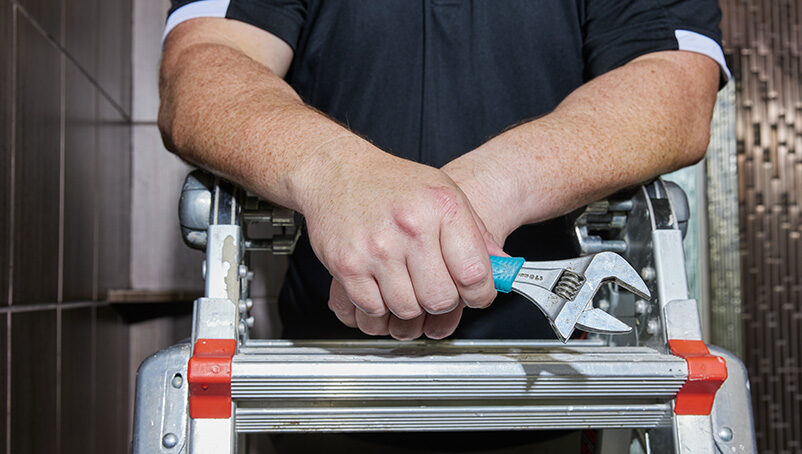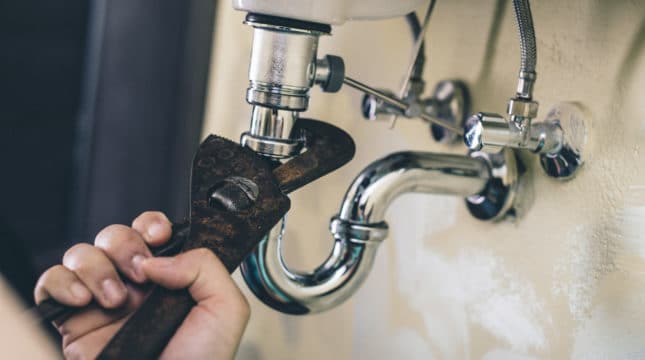How to get a plumbers license in Texas
All plumbers in Texas must have a license issued by the Texas State Board of Plumbing Examiners.
Four main types of Texas plumber licenses are available, depending on your scope of work. These include:
- Tradesman plumber. A tradesman plumber “may construct, install, repair, service or renovate plumbing for one and two-family dwellings under the supervision of a responsible master plumber.” These plumbers may also directly supervise plumber apprentices on job sites for one and two-family dwellings.
- Journeyman plumber. Journeyman plumbers “may install, change, repair, service or renovate plumbing under the supervision of a responsible master plumber.” These plumbers may also directly supervise plumber apprentices on any jobsite and tradesperson plumbers on job sites for structures other than one- and two-family dwellings.
- Master plumber. A master plumber “may install, change, repair, service or renovate plumbing under the supervision of a responsible master plumber.” These plumbers may also directly supervise plumber apprentices on any jobsite and tradesperson plumbers on job sites for structures other than one and two-family dwellings.
- Plumbing inspector. Plumbing inspectors “may inspect plumbing work performed within the jurisdiction of any political subdivision with which the inspector is affiliated.” They can also complete customer service inspection certifications for public drinking water systems.
In addition to obtaining a license, plumbers may seek out an endorsement or designation in one or more of the following categories:
- Medical gas piping installation
- Multipurpose residential fire protection sprinkler specialist
- Water supply protection specialist
- Responsible master plumber
Plumber apprentices must be registered but do not need to be licensed.
To get your Texas plumbers license, follow these four steps:
1. Submit your application and fee
To get your license, you must submit a Texas plumber license application to the Board along with the following supporting documents:
- Proof of citizenship, permanent residence or authorization to work in the U.S.
- Copy of a photo ID
- Employer Certification Form(s)
- Certificate of training program completion (if applicable)
- Supplemental Criminal History Information Form (if applicable)
- Verification letter of licensure in another state (if applicable)
You must also submit your application fee:
- Tradesman plumber: $36
- Journeyman plumber: $40
- Master plumber: $175
- Plumbing inspector: $55
2. Take the exam
Upon approval of your application, you may schedule your licensing exam. The exam consists of several parts, with variations depending on the license classification you’re applying for:
Tradesman and journeyman plumber license exams:
- Written multiple-choice questions
- Hands-on shop work (measuring, cutting, assembly, etc.)
- Design of a two-story drainage and vent system
Master plumber license exam:
- Written multiple-choice questions
- Pipe and vent sizing charts
- Design of a three-story drainage and vent system
Plumbing inspector license exam:
- Written multiple-choice questions
- Pipe and vent sizing charts
3. Pay the license fee
After passing the exam, you must submit a license fee to the Board:
- Tradesman plumber: $35
- Journeyman plumber: $40
- Master plumber: $75
- Plumbing inspector: $55
It takes about 30 days to process a Texas plumber license application. You will receive a letter seven to 10 days after your application’s approval.
Due to high demand, the earliest that most applicants can schedule their exam is about six to eight weeks after the application approval date. You will receive your exam results via mail within 30 days.
Texas does not have reciprocity agreements with other states. In most cases, however, the Board credits hours worked in another state toward plumber license work experience requirements.
Insurance for plumbers in Texas
Plumber insurance can help protect your work as a licensed plumber. The following Texas business insurance options are available for plumbers.
General liability insurance
General liability insurance in Texas can help provide coverage for common types of work-related third-party accidents and property damage. If you have a responsible master plumber designation, you must submit proof of liability insurance to the Board.
Workers’ compensation insurance
Workers’ compensation insurance can help provide wage protection and other benefits if you or a staff member is injured on the job.
Tools and equipment insurance
Tools and equipment insurance can help cover the costs to repair and replace your plumbing gear when damage or theft occurs.
Commercial auto insurance
If you drive for work, commercial auto insurance can help cover costs related to accidents, such as medical expenses and property damage.
Commercial property insurance
If property you own or rent is damaged or vandalized, commercial property insurance can help pay for related costs. This coverage may also apply to equipment and inventory for your business.
What is the certificate of insurance requirement for plumbers?
Master plumbers who choose to add the responsible master plumber (RMP) designation to their license must have a minimum of $300,000 of commercial liability insurance coverage.
Applicants for this designation must submit a certificate of insurance with the Texas State Board of Plumbing Examiners listed as the certificate holder.
Texas plumbers license requirements
All licensed plumbers must have a high school diploma or equivalent. In addition, they must fulfill the work experience and training requirements for their license classification.
Tradesman plumber
You must register as a plumber’s apprentice, a tradesperson plumber limited in Texas or a journeyman or master plumber in another state. You must have at least 4,000 hours of experience.
Unless you are a licensed journeyman or master plumber in another state, you must complete a 24-hour approved training course covering the following topics:
- Occupational Safety and Health Administration Outreach Training (10 hours)
- International Residential Code and/or Uniform Plumbing Code (8 hours)
- Continuing Professional Education (6 hours)
Journeyman plumber
You must be registered as a plumber’s apprentice, a tradesman plumber limited in Texas or a journeyman or master plumber in another state. You must have at least 8,000 hours of experience.
Unless you are a licensed journeyman or master plumber in another state, you must complete a 48-hour approved training course covering the following topics:
- Commercial plumbing codes (18 hours)
- Continuing Professional Education (12 hours)
- Occupational Safety and Health Administration Outreach Training (10 hours)
- International Residential Code and/or Uniform Plumbing Code (8 hours)
Master plumber
You must fulfill one of the following work experience qualifications:
- You must currently be licensed as a journeyman plumber in Texas or another state and have at least four years of experience.
- You must be licensed for at least one year as a journeyman plumber in Texas or another state and have completed an approved training program.
- You must be a master plumber in another state and have held a journeyman license for at least four years.
- You must be a master plumber in another state, have held a journeyman license for at least one year, and have completed an approved training program.
Plumbing inspector
You must fulfill one of the following work experience qualifications:
- You must currently be licensed as a journeyman plumber, master plumber, professional engineer or architect in Texas or as a plumbing inspector in another state with equivalent licensing requirements.
- You must have completed 500 hours of credit based on previous training and experience in the plumbing industry.
Requirements for Texas plumbers license renewal
When your Texas plumbers license is issued for the first time, the expiration date is set six to 18 months after the date you passed the exam. After that, all Texas plumber licenses renew annually. You must complete six hours of continuing education to qualify for renewal.
You must pay the appropriate fee to renew your license each year:
- Tradesman plumber: $35
- Journeyman plumber: $40
- Master plumber: $75
- Plumbing inspector: $55
How NEXT helps support Texas plumbers
NEXT has plumber insurance to help protect yourself and your business. We’ve helped thousands of contractors get affordable insurance packages customized to serve their needs.
Apply for coverage online and get a certificate of insurance in under 10 minutes. Get a quote, review your options and buy online. Download and share additional COIs from any computer or mobile device 24/7 at no extra charge.
Start a free quote with NEXT.






